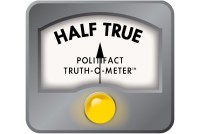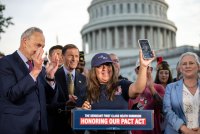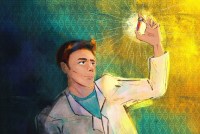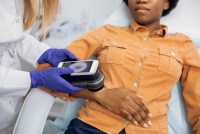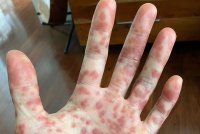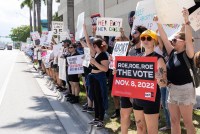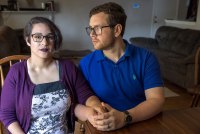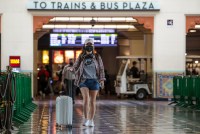Latest Morning Briefing Stories
Rapper Fat Joe Says No One Is Making Sure Hospitals Post Their Prices
A TV and social media ad offers a reason to check on the enforcement of a sweeping rule that requires hospitals to post information about what they charge insurers and cash-paying patients.
Covid Sewage Surveillance Labs Join the Hunt for Monkeypox
Wastewater testing has proved a reliable early alarm bell for covid outbreaks. U.S. researchers are now adapting the approach to track the explosive spread of monkeypox.
After ‘a Lot of Doors Shut in Our Face,’ Crusading Couple Celebrate Passage of Burn Pit Bill
Le Roy and Rosie Torres founded the Burn Pits 360 group that advocated for years for Congress to help veterans suffering from injuries caused by the massive disposal sites on overseas bases. Le Roy came home from Iraq suffering from breathing problems.
Exploitative practices in medical research have contributed to the underrepresentation of Native people in clinical trials. Episode 10 explores the efforts of Indigenous scientists to rebuild this broken trust through tribally controlled research.
Tribe Embraces Recreational Marijuana Sales on Reservation Where Alcohol Is Banned
The Pine Ridge Indian Reservation in South Dakota allows people to buy and use recreational marijuana but not alcohol. Some tribal citizens say cannabis is safer than alcohol, meth, and opioids — which have wreaked havoc on the state’s Indigenous communities.
Patients and Doctors Trapped in a Gray Zone When Abortion Laws and Emergency Care Mandate Conflict
Since the U.S. Supreme Court overturned Roe v. Wade in June, ER doctors say they — and their patients — are trapped between state anti-abortion laws and the federal law requiring that care be delivered in emergency situations. Women’s lives hang in the balance.
Skin Cancer Is a Risk No Matter the Skin Tone. But It May Be Overlooked in People With Dark Skin.
Black people and those with high levels of melanin in their skin have long been left out of efforts to combat skin cancer. Historically neglected both by sunscreen manufacturers and a medical community lagging in diversity and cultural competency, many people with dark skin tones have not been informed about sun safety or how to monitor their skin for damage or cancer.
Cognitive Rehab May Help Older Adults Clear Covid-Related Brain Fog
People whose brains have been injured by concussions, traumatic accidents, strokes, or neurodegenerative conditions such as Parkinson’s disease can benefit from targeted therapy. Experts also employ therapies for long-covid patients with memory and language problems.
In California, Abortion Could Become a Constitutional Right. So Could Birth Control.
Proposition 1, the constitutional amendment that would enshrine abortion in California’s constitution, would also lock in a right that has gotten less attention: the right to “choose or refuse” contraception.
A GOP Talking Point Suggests Birth Control Is Not at Risk. Evidence Suggests Otherwise.
Republicans say Democrats are wrong to claim that birth control could be the Supreme Court’s next target. But Democrats have plenty of evidence that it might be.
KHN’s ‘What the Health?’: Kansas Makes a Statement
In the first official test vote since the Supreme Court overturned Roe v. Wade, voters in Kansas’ primary said in no uncertain terms they want to keep a right to abortion in their state constitution. Meanwhile, the Senate is still working to reach a vote before summer recess on its health care-climate-tax measure, but progress is slow. Tami Luhby of CNN, Sandhya Raman of CQ Roll Call, and Rachel Cohrs of Stat join KHN’s Julie Rovner to discuss these issues and more. Also this week, Rovner interviews KHN’s Bram Sable-Smith, who wrote the latest KHN-NPR “Bill of the Month” installment about a very expensive ambulance trip.
When Mental Illness Leads to Dropped Charges, Patients Often Go Without Stabilizing Care
When criminal suspects are deemed too mentally ill to go through the court process and their charges are dropped, they can be left without stabilizing treatment — and sometimes end up being charged with additional crimes.
‘Children Are Not Little Adults’ and Need Special Protection During Heat Waves
Public health experts say heat waves pose health risks for children, whose bodies may not be as effective at cooling and who rely on caretakers to prevent and notice the signs of heat-related illness.
A California Man’s ‘Painful and Terrifying’ Road to a Monkeypox Diagnosis
A Bay Area man described himself as “delirious” from the pain of a quickly spreading rash, but it took six telehealth appointments, one urgent care visit, and two emergency room trips before he was finally diagnosed and treated for monkeypox.
Music Festivals Embrace Overdose Reversal Drugs, but Fentanyl Testing Kits Remain Taboo
Music festival promoters are allowing distribution of overdose reversal medication as fentanyl deaths continue to surge. But nonprofits and volunteers are often left to do the work, and more controversial forms of harm reduction aren’t openly allowed.
‘An Arm and a Leg’: Her Bill for a Prenatal Test Felt Like a ‘Bait-and-Switch’ Scheme
Her doctor told her the noninvasive genetic test would be $99. When she called, she was told $250 and if she didn’t pay quickly it could be $800.
They Lost Medicaid When Paperwork Was Sent to an Empty Field, Signaling the Mess to Come
Tennessee expects to soon disenroll about 300,000 people from its Medicaid program. But families like the Lesters have suffered when bureaucracy and clerical mistakes caused them to unfairly lose coverage under the same program.
Two-Thirds of Americans Disapprove of Ending ‘Roe,’ but It’s Not a Top Voting Issue
Despite concerns about making abortion legal in the states and strong interest in the issue, three-quarters of Americans say economic matters are top of mind as they consider voting in the fall, according to a new KFF poll.
Because of Texas Abortion Law, Her Wanted Pregnancy Became a Medical Nightmare
A Houston woman was 18 weeks pregnant when her water broke. That means her fetus had virtually no chance of survival, and she was at risk of an infection that could threaten her future fertility and even her life. Following Texas’ law, the hospital made her wait until she was showing signs of serious infection to terminate the pregnancy.
The Time Has Come for DIY Mandates on Covid
Yes, lots of us suffer from pandemic fatigue and have been getting sloppy about precautions in recent months. But with covid an ongoing menace — and governments reluctant to return to sweeping mandates — it’s time for all of us to step up our game.



